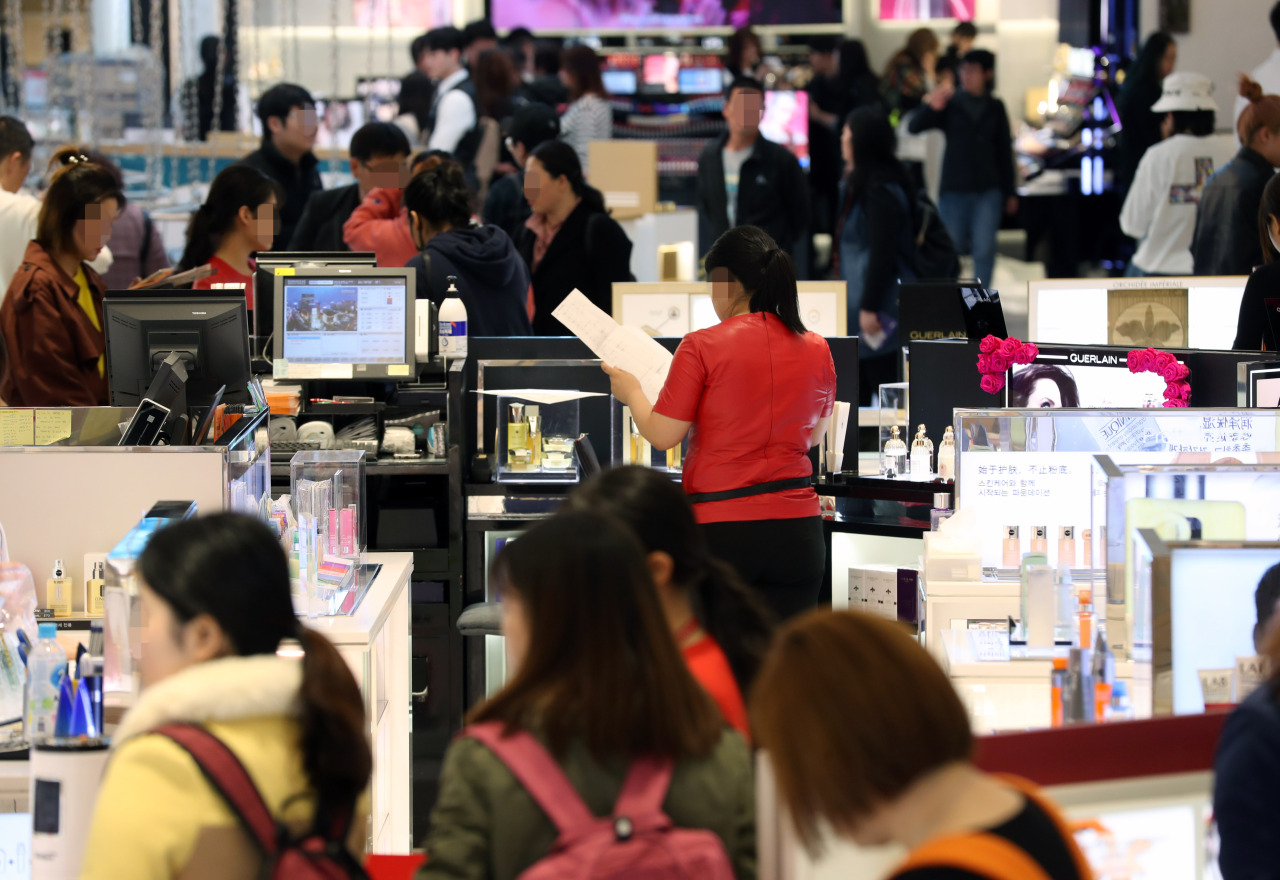Duty-free business becomes cash cow only for bigger players
Falling inbound travelers, saturated market threaten profitability of small players, late starters
By Kim Da-solPublished : May 6, 2019 - 15:29
Hanhwa Group’s decision to withdraw from the duty-free business from September due to ballooning losses -- some 117 billion won ($100 million) of accumulated operating losses -- has shaken the industry, though many had predicted the closure.
“It is not an exaggeration to say that there were more employees than customers at Hanwha’s downtown duty-free store in Yeouido, although many visitors seemed to visit the landmark 63 Building where the store is located. The location was relatively less-visited among tourists or local shoppers, compared to Myeong-dong, where Lotte and Shinsegae have duty-free stores,” said a 32-year-old cosmetics merchandiser, who declined to be named.
“It is not an exaggeration to say that there were more employees than customers at Hanwha’s downtown duty-free store in Yeouido, although many visitors seemed to visit the landmark 63 Building where the store is located. The location was relatively less-visited among tourists or local shoppers, compared to Myeong-dong, where Lotte and Shinsegae have duty-free stores,” said a 32-year-old cosmetics merchandiser, who declined to be named.

Hit by a sharp drop in big-spending Chinese travelers and a saturated market for downtown duty-free stores, Hanwha began to pull out from the duty-free business last year, becoming the first conglomerate to voluntarily do so after the withdrawal of Aekyung in 2000.
Amid deteriorating sales, Hanwha had pulled out its duty-free store at Jeju Airport in 2018, four years after its launch.
Although Hanwha Galleria Duty Free 63’s license was due to expire in late 2020, the company said the earlier-than-expected closure would allow the group to focus on raising the competitiveness of its department stores and to invest in new areas for growth.
Sales of Hanwha Galleria Duty Free 63 had remained in the red since it posted an operating loss of 17.8 billion won in 2016.
‘Too many licenses’
Industry experts say Hanwha’s withdrawal is likely to have repercussions across the industry, as it is an indication that duty-free retailers face critical issues, particularly smaller players.
From 2015 to 2018, the number of downtown duty-free stores rose from six to 13, following the government’s additional approval of operational licenses to boost the market amid a growing number of inbound Chinese tourists at the time.
Of the 13, Lotte operates three, while Shinsegae has two duty-free stores downtown. Shilla, HDC Shilla, Hyundai Department Store, Doota and Hanwha Galleria operate one each. The remaining three downtown duty-free stores are run by small operators Donghwa, SM and Top City.
However, the industry soon experienced sluggish sales due to a diplomatic row with China in 2017 over Seoul’s deployment of the US Terminal High Altitude Area Defense system -- a move opposed by Beijing.
The approval of additional licenses intensified competition among small and midsized duty-free operators against big players such as Lotte and Shilla.
“The small and midsized duty-free operators pay 10 to 20 percent higher commissions for Chinese shuttle traders when they bring in group travelers (compared to Lotte and Shilla),” said an industry insider.
The domestic duty-free market heavily relies on Chinese vendors known as “daigongs” -- individual merchants from China who purchase products like Korean cosmetics in bulk and resell them in China. They often partner with Korean travel agents to attract group visitors.
“Not only Hanwha, but low-performing duty-free operators such as SM and Doota had to pay higher commissions, which has now left them with burgeoning losses,” he said.
Late starters and small-sized duty-free stores have seen sales worsen. As of last year, SM’s duty-free business had logged an accumulated deficit of 69.3 billion won, while Doota recorded negative 60.5 billion won.
Winner takes all
Furthermore, the duty-free market here is dominated by big players.
According to Korea Customs Office data, sales of duty-free operators at downtown stores logged 4.9 trillion won in the first quarter of this year. More than 90 percent of the sales came from three major duty-free operators here, Lotte, Shilla and Shinsegae.

As of last year, Lotte Duty Free held market share of 41.9 percent among 48 licensed duty-free retailers in the country.
Shinsegae posted 36.3 billion won of operating profit in 2018, a twofold increase from the previous year. HDC Shilla’s operating profit also jumped to 10.7 billion won from 5.2 billion won in 2017.
“Large duty-free stores also have stronger buying power, considering that they can purchase products at lower prices or at better deals -- such as getting shopping bags for free when buying products from a certain brand -- therefore it is impossible for late starters or small-sized operators to beat the main players,” said an industry insider.
“If the government issues more licenses in the future, small or new duty-free business operators may face additional closure,” he added.
According to the Ministry of Economy and Finance, authorities will hold a committee meeting to discuss giving out additional downtown duty-free store operation licenses. New licenses can be issued when duty-free store sales increase by 200 billion won from the previous year or the number of foreign tourists go up by 200,000. Seoul and Jeju met the criteria as of last year.
Meanwhile, Park Jung-eun, a professor of business from Ewha Woman’s University, highlighted the favorable locations of big duty-free stores.
“Daigongs, who need to purchase as many products (as possible) from popular brands within the shortest period, tend to stay in the northern Seoul area for shopping, where most duty-free stores are located,” she said, adding that accessibility is critical for duty-free stores.
Daigongs usually shop at the Lotte duty-free store in Myeong-dong, move to Shinsegae duty-free store across the street and then the Shilla duty-free store in Jangchung-dong, just 10 minutes away by car.
“Not having secured a good location had caused Hanwha to suffer from sales loss,” she added.
By Kim Da-sol (ddd@heraldcorp.com)



![[Exclusive] Korean military set to ban iPhones over 'security' concerns](http://res.heraldm.com/phpwas/restmb_idxmake.php?idx=644&simg=/content/image/2024/04/23/20240423050599_0.jpg&u=20240423183955)

![[Graphic News] 77% of young Koreans still financially dependent](http://res.heraldm.com/phpwas/restmb_idxmake.php?idx=644&simg=/content/image/2024/04/22/20240422050762_0.gif&u=)



![[Pressure points] Leggings in public: Fashion statement or social faux pas?](http://res.heraldm.com/phpwas/restmb_idxmake.php?idx=644&simg=/content/image/2024/04/23/20240423050669_0.jpg&u=)










